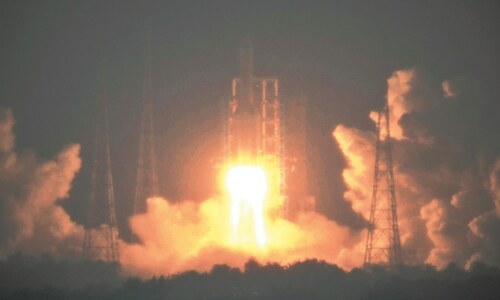ISLAMABAD: The government on Monday reduced petroleum prices by up to five per cent for January to partially pass on to consumers the benefit of a major dip in international oil prices.
In doing so, the government made a substantial increase in taxes on major petroleum products to mop up its revenues amid serious shortfalls in tax targets being faced by the tax machinery. The government increased taxes by almost Rs10.75 per litre on diesel and about Rs4.65 on petrol. This would generate about Rs10.5bn in additional revenue during January, an official told Dawn.
According to an announcement by the finance ministry, the ex-depot price of High Speed Diesel (HSD) was cut by 3.8pc or Rs4.26 per litre to Rs106.68 from Rs110.94. The Oil and Gas Regulatory Authority (Ogra) had worked out Rs15 per litre reduction that would have brought down HSD rate to Rs95.
The ex-depot price of petrol has been reduced by about 5pc or Rs4.86 per litre to Rs90.97 from Rs95.83. Ogra had recommended a reduction of Rs9.50 per litre in petrol price to Rs86.33.
Diesel, petrol rates cut by over Rs4 per litre
The government reduced the ex-depot price of kerosene by 52 paisa to Rs82.98 per litre from Rs83.50. The ex-depot price of Light Diesel Oil (LDO) was also cut by Rs2.16 to Rs75.28 per litre from Rs77.44.
The retail rates are generally 30 to 50 paisa per litre higher than ex-depot prices announced by the government as oil companies and dealers are free to set their retail rates depending on distance between the retail stations and oil depots maintained by them.
The petrol and HSD are two major products that generate most of revenue for the government because of their massive and yet growing consumption in the country. HSD sales across the country are now going beyond 800,000 tonnes per month against monthly consumption of around 700,000 tonnes of petrol. The sales of kerosene and LDO are generally less than 10,000 tonnes per month.
The petroleum prices have generally been on the rise since early 2017 except a couple of reductions. Over the last few weeks, the international benchmark Brent prices have tumbled by almost 20pc to less than $60 but the International Monetary Fund (IMF) is reported to have advised the authorities to raise taxes to create buffers. For the last couple of months, the government has been following a middle path of gradually increasing tax rates on oil products.
The government has been struggling to finalise an economic bailout package from the IMF for what it claims tough conditionalities, including steep fiscal adjustment mostly through increased taxes.
Published in Dawn, January 1st, 2019














































Dear visitor, the comments section is undergoing an overhaul and will return soon.